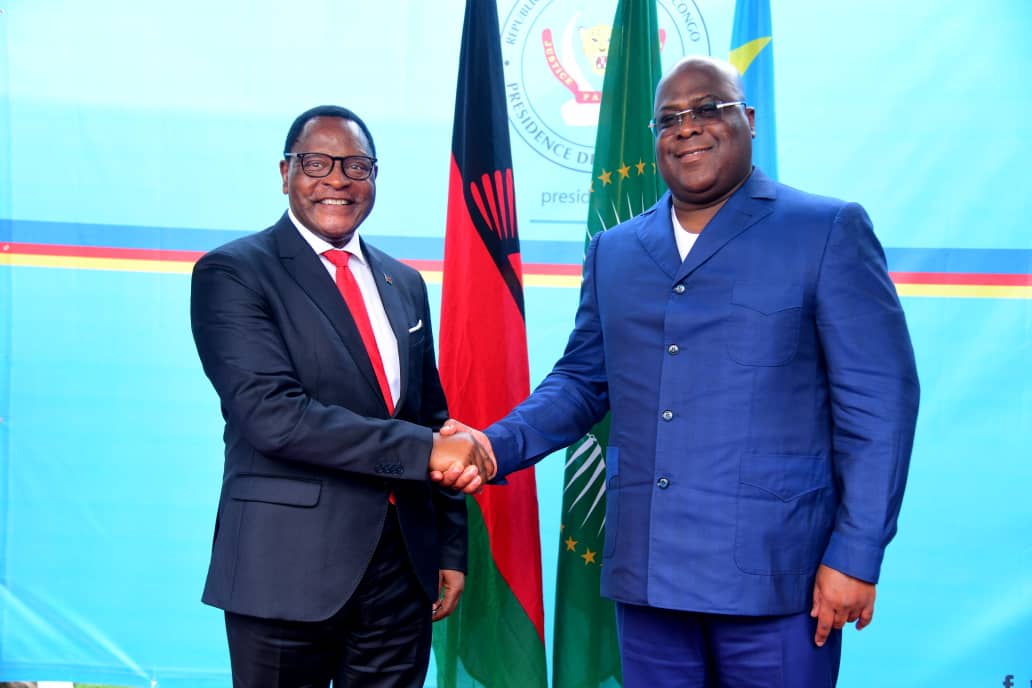|
Getting your Trinity Audio player ready…
|
His Excellency President Félix Antoine Tshisekedi Tshilombo of the Democratic Republic of Congo (DRC) is the incoming Chair of the Southern African Development Community (SADC) amid calls by President Lazarus McCarthy Chakwera of Malawi, the outgoing chairperson, for member states to promote regional integration in the face of multi-faceted challenges in the regional bloc.
In his address during the handover ceremony at the 42nd Ordinary Summit of the SADC Heads of State and Government in the Democratic Republic of the Congo today, President Chakwera underscored the need for a celebration of solidarity and the consolidation of SADC’s quest for shared prosperity.
“The bond of kinship between our nations, between the 340 million people who call SADC home, and between us as their leaders are no mere gimmick. It is an unbreakable bond that transcends ethnicity, for ours is a bond steeped in shared values. Ours is a bond flowing naturally from the historical, geographical, cultural, economic, political, social, and spiritual DNA that connects us. And I myself have felt this bond most strongly over the past year through the support you accorded me and the Republic of Malawi during our tenure as Chair of SADC. It has been an honour working with you all, and I thank you most sincerely for trusting me this past year to lead the way in the advancement of the cause of Regional Integration,” he said.
President Chakwera said the progress and gains made on regional integration require a collective effort to be bolstered and maximized, insisting on the importance of remaining resolute and relentless in the quest for the fruits of regional integration efforts.
“SADC is open for business, but it is up to us to see that it becomes even more so. SADC is safe, but we must ensure it remains so. SADC is peaceful, but we must keep it so. SADC is attracting global trade and investment, but we must safeguard the factors that will guarantee that it is always so. And SADC is democratic, an example to the world of credible elections and peaceful transitions of power, but we must see that it continues to be so.”
President Chakwere called on member states to continue such efforts to entrench democratic values and constitutionality in the region as the SADC Electoral Observation Mission (SEOM), which successfully conducted its mission in the Republic of Zambia in August 2021 with the joint Organ Troika and SADC Electoral Advisory Council (SEAC).
The Government of Zambia was commended for holding credible and peaceful elections; elections that upheld SADC democratic principles. He also commended the SEAC Post-Election Reviews conducted for the Republic of Angola, the Democratic Republic of the Congo (DRC) and the Kingdom of Lesotho to assess progress made and said such efforts are essential for supporting Member States in strengthening good governance and democracy, which are indispensable to the stability that gives SADC a competitive advantage as a destination for investment, trade, and tourism.
In the same vein, since the deployment of the SADC Mission in Mozambique (SAMIM) in July 2021, a number of milestones have been achieved. These include the recapturing of villages; the dislodging of terrorists from their bases; and the seizure of weapons and warfare material. This has boosted the confidence of the communities that SAMIM forces are there to keep secure, giving them a sense of security and allowing internally displaced persons to return to their normal lives.
The bloc’s blueprint is the SADC Regional Indicative Strategic Plan (RISDP) 2020-30 which was adopted in August 2020 and ensures that even in the face of such challenges as COVID-19, violent extremism, climate change impacts like cyclones, and geopolitical shocks like the impact of the Ukraine-Russia conflict, the region remains on a growth path of achieving its regional commitments.
President Chakwera urged SADC leaders to refuse to be daunted by the obstacles and odds against the region, no matter how formidable they are.
“Take the assault we have come under from Climate Change. Our region has faced Cyclone Ana, Cyclone Batsirai, Cyclone Dumako, Cyclone Emnat, each leaving a trail of death and destruction in Madagascar, Malawi, Mozambique and Zimbabwe, with millions of our people left injured and suffering loss of livelihood. Even in the Seychelles, the rains came with more heavy and high intensity than ever before. And who among us can forget the heart-breaking scene of severe flooding and landslides that devastated KwaZulu Natal in South Africa just four months ago, or by the footage of thousands of houses and other infrastructure being washed away in the wake of that deluge?
“These are real threats, but I insist that our resolve to thrive in spite of them must remain unabated. I am therefore proud that in the midst of all these calamities, we pulled our resources together and came to each other’s aid. For instance, we supported South Africa and Madagascar with 300,000 US dollars and 200,000 US dollars respectively, which was drawn from the SADC Contingency Fund. That is what solidarity looks like, and it is the bedrock of our region’s resilience.”
In his maiden speech at the summit, President Hakainde Hichilema of Zambia called on SADC to emulate the solidarity and revolutionary spirit of liberation icons, whose principled positions and sacrifice have enabled citizens to benefit from the liberties they enjoy today.
Due to the recurrent nature of climate change-induced disasters with likely increased severity and frequency, President Hichilema said the time for making the SADC Humanitarian and Emergency Operations Centre (SHOC) operational is now and promised to table the necessary Inter-Governmental Memorandum of Agreement to move towards that milestone.
The theme for the summit is “Promoting industrialization through, agro-processing, mineral beneficiation, and regional value chains for inclusive and resilient economic growth.”
